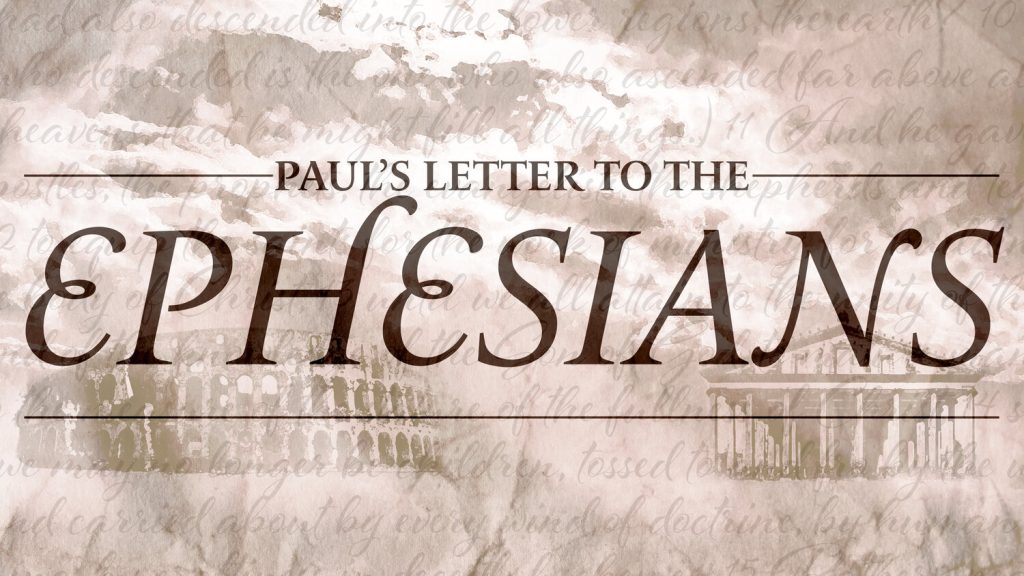Tonight we are wrapping up our study of Ephesians with Ephesians 6:10-24. This concludes our discussion of this letter. We will pick up Paul’s shortest letter, Philemon, next week.
Overview:
If you have time today, please read through the entirety of Paul’s letter and review our discussions. Throughout this letter, Paul gives us the blessed assurance that we are saved by God’s grace, through the faith and works of Christ Jesus, in and through the Holy Spirit. This salvation consists of being fully reconciled to God and to our neighbor by Christ’s overcoming, on our behalf, of the powers and principalities in the heavenly places. The church is both the place of this reconciliation and a witness to it. Our role is to stand firm in this knowledge of the love of God and Christ’s defeating the evil powers that bring death. We stand firm by cultivating the Christian virtues of humility, gentleness, patience, and love of one another, and by retaining the unity of the Spirit in the bond of peace, not only in general terms but in our specific and everyday relationships. These virtues necessarily arise out of gratitude and thanksgiving. Once more, it is the church where this gratitude is expressed and where the nurturing and practicing of these virtues occurs. It is the Church that is the Bride of Christ, and the Church that provides us the strength and power to stand firm against the spiritual forces of evil. This is Paul’s message.
Tychicus: (vv.21)
Tychicus is the bearer of this letter to the Ephesians. He was one of Paul’s companions very late in his ministry. Tychicus was a native of Asia. Acts 20:2. He was with Paul at the end of his third missionary journey, which included Paul’s journey through Asia Minor and Paul’s visit with the leaders of the church in Ephesus. Acts 20. He was probably with Paul when Paul was arrested in Jerusalem and probably accompanied Paul to Rome when Paul appealed to Ceasar. Acts 21:33, 25:12. Tychicus is the only individual mentioned in Ephesians. His mention in Ephesians is identical to his mention in Colossians. Col. 4:7-8. Tychicus was known to the audience of this letter.
Final Benediction: (vv.23-24)
This final benediction mirrors Paul’s initial greeting – there is grace and peace from God our Father and the Lord Jesus Christ. Eph. 1:2. Grace and peace are the touchstones throughout this letter. They are our beginning and our end.
Paul finishes his letter with the phrase “loving the Lord Jesus Christ in aphtharsia” v.24. This word means indestructibility or incorruptibility, and thereby immortality. This is the same word that Paul uses in describing the resurrected body in 1 Corinthians 15 (see below). Paul ends with a statement reminding the Ephesians of our eternal, spiritual, incorruptible, immortal, death-defeating, teleological end. The audience would have been familiar with Paul’s teaching on this point. Therefore, as the letter begins with God’s plan which was set forth from the beginning that all things would be united in Christ, so Paul ends this letter with this same teaching that death is defeated and God will be all in all. Eph. 1:10, 1 Cor. 15:28.
SCHEDULE – On November 12, we will be assembling Christmas Stockings to send to children in WNC who have been affected by the flooding. We would love anyone who is called to help us with the supplies we need for these stockings: $20 Walmart Gift Cards, flashlights and batteries, coloring books, individually packaged toothbrushes and travel-size toothpaste, Playing cards, gum and hard candy, bubbles, hand sanitizer, small stuffed toys (3 “ or smaller).
Dinner is a 6. The menu is chicken potato casserole. Discussion about 6:45. Compline around 8. Please join us!
What is sown corruptible, will be raised incorruptible . . . for the dead with be raised incorruptible, and we shall be changed. For this corruptible nature must put on incorruptibility, and this mortal nature must put on immortality. The corruptible puts on the incorruptible, and the mortal puts on the immortal, then shall come to pass the saying that is written: “Death is swallowed up in victory, O death, where is thy victory? O death, where is thy sting.” 1 Corinthians 14:42b, 52b-55.

